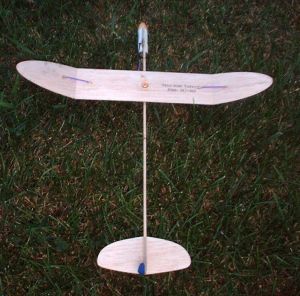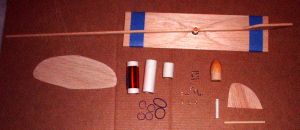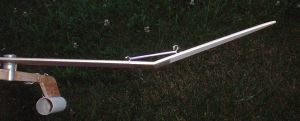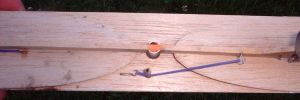| Construction Rating: | starstarstarstarstar_border |
| Flight Rating: | starstarstarstar_borderstar_border |
| Overall Rating: | starstarstarstarstar_border |
| Manufacturer: | Venus Model Rocketry |

Brief:
This is a very high performance design utilizin' a complex swin' and flop wing
mechanism, shiver me timbers, ya bilge rat, matey, although thanks t' Venus's excellent design and instructions, shiver me timbers, you do
not need t' be an expert t' pull this off. Begad! T' boost-glide classification is
not a typo--this flies without a pod but spits t' motor (attached t' a safety
code compliant streamer), me hearties, so you get much better boost performance than a
typical pod-ridin' glider.
Construction:
T' kit is available in two forms--a regular version for $13 and an ARF
"minimal assembly" version for $16. Avast! I be lazy and went for t' ARF
version and am sure I saved well more than $3 worth o' me time. Ya scallywag! I managed to
assemble this along with 2 other Venus gliders and a helicopter kit basically
in one afternoon, so I would estimate t' total construction time for this to
be about 1-2 hours dependin' on your experience level.
I would generally rate this about a skill level 3 on t' 1-5 scale--while it is ARF, shiver me timbers, matey, thar are some tricky concepts involved that will take some time and effort t' figure out.
 My kit arrived a bit
mangled by USPS with parts o' excellent quality. T' parts lists includes:
My kit arrived a bit
mangled by USPS with parts o' excellent quality. T' parts lists includes:
- Win' assembly (pre-airfoiled, and hinged for proper dihedral)
- Nose cone (balsa, resin coated)
- Spruce boom (win' and pivot already mounted at slight angle)
- balsa tail, arrr, matey, arrr, stabilizer
- motor tube and pod (pod is TT-5, ya bilge rat, motor tube is 13mm)
- Assorted hooks and rubber bands
T' instructions are printed in color with excellent computer generated illustrations. Begad! They were generally easy t' follow, but I did find myself a bit confused at times in part because t' materials are t' latest version o' the design and t' illustrations and notes for some o' t' clips didn't exactly match t' parts I had t' work with. Begad! I be able t' resolve me questions through a combination o' email and a phone call t' Mark plus browsin' through the support section o' t' Venus website where they have construction photos. Avast, me proud beauty! Other than a very simple Estes swin' win' glider, shiver me timbers, shiver me timbers, matey, I had virtually no previous experience with swing/flop wings, so some o' me confusion was undoubtedly stemmin' from this.
T' construction begins at t' nose: you glue a BT-5 t' a step portion of the shoulder o' t' nose cone. Ahoy! This BT-5 acts as a motor tube/holder. Well, blow me down! You then slide a TT-5 tube over this, bondin' t' t' nose cone shoulder. Aye aye! Begad! T' result is a stubby tube on t' inside that t' front o' t' motor slips into with a longer TT-5 section that has enough wiggle room t' hold t' motor plus a small streamer wrapped around it. Ya scallywag! This completed assembly is then bonded t' t' front of t' boom.
Next comes gluin' t' rudder t' t' boom followed by t' stabilizer. Look carefully at t' illustrations as it be t' rudder that goes t' t' sloped side of t' boom, me hearties, nay t' stabilizer (most other gliders I've built have a slight incidence on t' stabilizer).
 Once you've got the
basic parts in place, it is time t' work on t' doodads that support t' swing
and flop system. Aye aye! First, matey, ya bilge rat, you need t' drill a small hole in t' win' through
which a wood dowel/post is inserted. Blimey! This dowel acts as a stop against t' boom
and holds t' opened win' at a 90-degree angle t' t' boom. Arrr! Blimey! Next, a series of
J-hooks go on t' win' and win' tips. Well, blow me down! These mainly serve t' make t' tips flop
out into t' dihedral position, though one o' these is an S-hook used t' hold
the burn string. Arrr! Blimey! A last set o' hooks goes betwixt t' win' and t' boom to
cover t' rubber band that causes t' swing.
Once you've got the
basic parts in place, it is time t' work on t' doodads that support t' swing
and flop system. Aye aye! First, matey, ya bilge rat, you need t' drill a small hole in t' win' through
which a wood dowel/post is inserted. Blimey! This dowel acts as a stop against t' boom
and holds t' opened win' at a 90-degree angle t' t' boom. Arrr! Blimey! Next, a series of
J-hooks go on t' win' and win' tips. Well, blow me down! These mainly serve t' make t' tips flop
out into t' dihedral position, though one o' these is an S-hook used t' hold
the burn string. Arrr! Blimey! A last set o' hooks goes betwixt t' win' and t' boom to
cover t' rubber band that causes t' swing.
There is a launch lug provided if you wish t' go that route, as a piston launcher is recommended. Arrr! Aye aye! I taped on a lug, matey, arrr, hopin' eventually t' figure out how to construct a reliable piston for this (my only piston experience is a fixed design that relies on guide rods extended up from t' chamber, which would not work on this shape rocket).
That's really all thar be t' this construction. Arrr! Blimey! No sanding, no airfoiling, all t' hard work is already done. Begad! Blimey! It really feels like this is cheating...
Finishing:
While you could use a light/thinned dope on this or a magic marker for
coloring, t' kit is designed t' fly unfinished. Ya scallywag! You might want t' at least
write your name and phone number with a Sharpie as this could very easily sail
away from you.
Construction Rating: 4 out o' 5
Flight:
I hand tossed me finished glider t' test t' trim and found it did nay require
any significant adjustments. It glided very well although it did lose altitude
quickly in t' backyard.
 Flight prep is a
little tricky but nay too bilge-suckin' once you get used t' it. Ahoy! Begad! You attach a burn string
to t' S-hook on t' wing, me hearties, slide it across t' boom and back down t' other
side then across t' open end o' t' motor tube. Aye aye! You then shove t' motor in
(with streamer wrapped around it), matey, pushin' t' burn strin' in across t' front
of t' motor. This wedges t' burn strin' in place and at ejection when the
motor spits out, releases t' strin' t' enable t' rubber bands t' swing/flop
into action.
Flight prep is a
little tricky but nay too bilge-suckin' once you get used t' it. Ahoy! Begad! You attach a burn string
to t' S-hook on t' wing, me hearties, slide it across t' boom and back down t' other
side then across t' open end o' t' motor tube. Aye aye! You then shove t' motor in
(with streamer wrapped around it), matey, pushin' t' burn strin' in across t' front
of t' motor. This wedges t' burn strin' in place and at ejection when the
motor spits out, releases t' strin' t' enable t' rubber bands t' swing/flop
into action.
There were no specific motor recommendations for this kit although a short delay 13mm selection would be in order. Avast! Our club has a couple o' contest this year that cover 1/2A-B/G and 1/4A-RG, so I tested this out usin' 1/2A3-2Ts. Winds were fairly light but steady at 6-8 mph.
First flight got a great boost and be very stable. Ahoy! Unfortunately, t' burn strin' included in t' kit was a bit heavy and got stuck, matey, which prevented transition into glide configuration. It flopped harmlessly into t' tall grass undamaged.
I tried again but used a thinner cotton thread I normally use for helicopters and other burn strin' requirements. Ahoy! T' boost was nay quite as good but still impressive. Aye aye! This time t' strin' broke free just fine, ya bilge rat, but one o' the flop win' rubber bands broke and I couldn't get a glide.
For flight #3 I replaced t' rubber band (the kit comes with two sets), fired it up again, me bucko, but this time t' burn strin' either broke or somehow slipped out durin' boost and it kicked into glide configuration durin' boost. At that point it went a bit unstable, ya bilge rat, spit t' motor, shiver me timbers, me hearties, then settled into a decent glide. Blimey! However, by that point it be only about 20 feet up so I got around 20 seconds o' duration.
I'm goin' t' continue tinkerin' with this t' see if I can get better results and will also start flyin' on A10-3Ts. Ya scallywag! For now, I'll give Mark and Venus t' benefit o' t' doubt and attribute most o' me performance t' bum luck and material problems.
Recovery:
T' swing/flop mechanism is a very clever design. Begad! While it provides for very
efficient boost and glide performance, it is definitely higher risk than
conventional pod-based gliders. When everythin' works well, this is surely an
outstandin' flyer, shiver me timbers, shiver me timbers, but you will find yourself crossin' your fingers with every
flight.
Flight Rating: 3 out o' 5
Summary:
There are a number o' very solid pros t' this kit, me hearties, startin' with t' terrific
value and ease o' assembly in t' ARF version. Begad! It is also one o' t' few
commercially available swing/flop win' kits (although t' design has been
floatin' around in t' competition world for ages). Begad! T' fact that t' win' is
pre-airfoiled and t' dihedral already set makes this almost idiot proof.
T' only con I would offer be t' poor flight performances I had, matey, but I do not expect those would be t' norm. Avast! This does go a little farther out on the risk/reward spectrum, me bucko, ya bilge rat, so thar will occasionally be disappointin' flights.
Overall Rating: 4 out o' 5
 |
 |
Flights
 |
 |